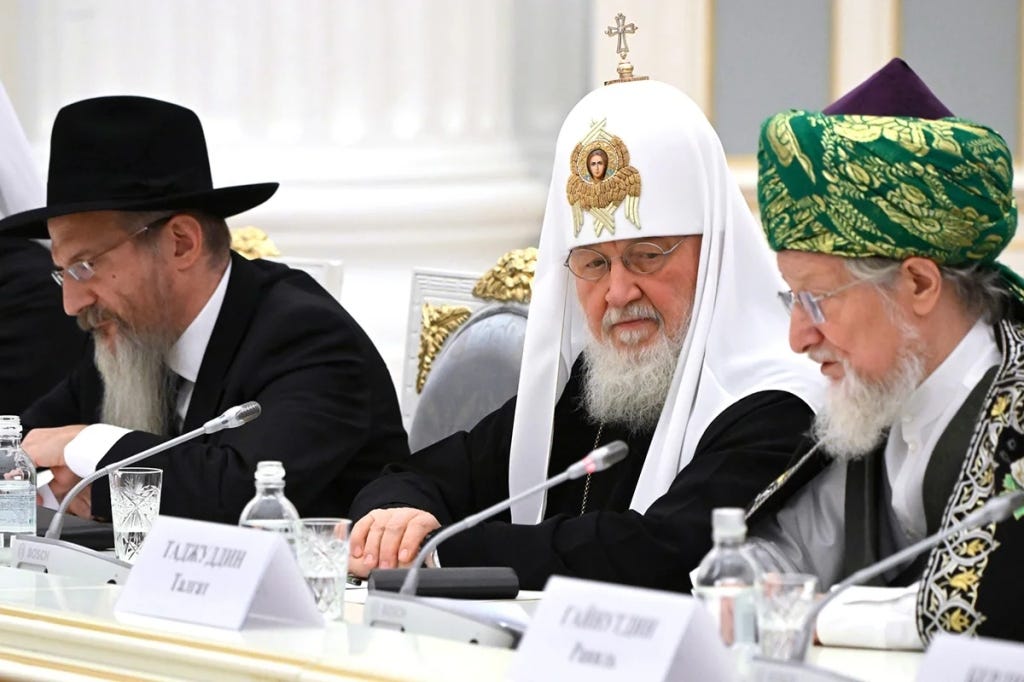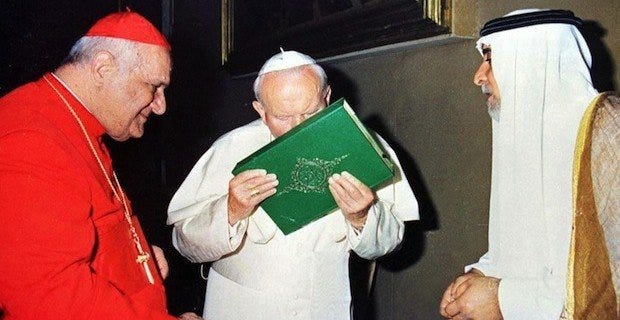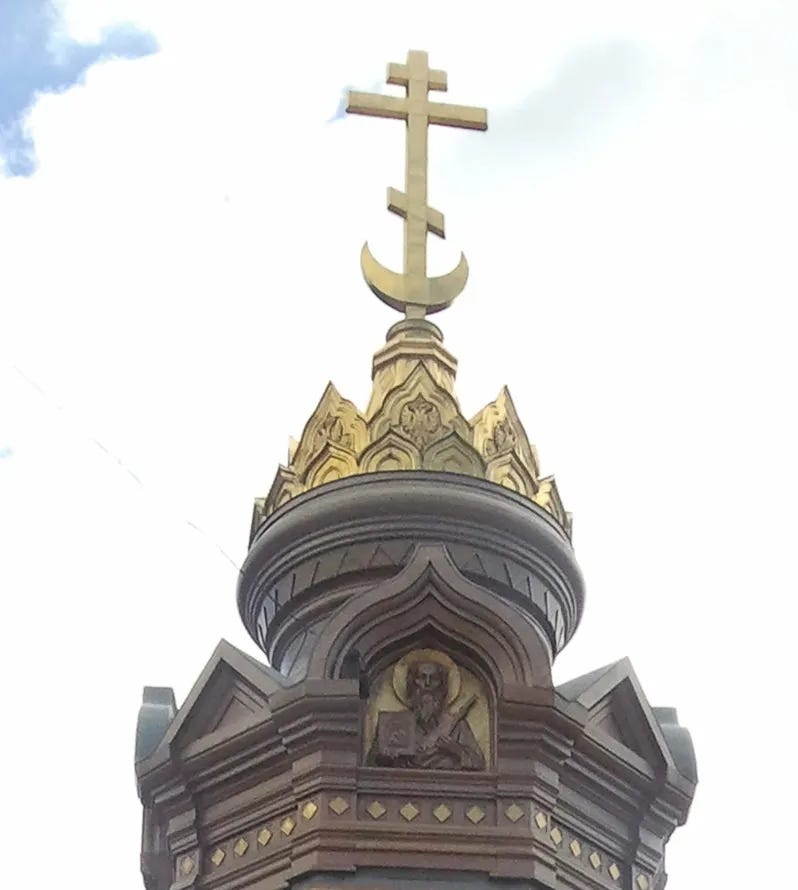Orthodox Christians do not Worship the God of Mohammad
Relatively recently, Jay Dyer had a three-way debate on the merits of Orthodoxy with Timothy Gordon and Aiden Mattis on Tim Pool’s program. The debate itself was nothing spectacular. If one has watched any debate between Dyer and a Catholic or Orthodox, then one has watched this one. However, given how Pool’s program has a substantial audience, and how many people who follow Pool will probably have little familiarity with Orthodoxy, I thought it worth listening to. Of all the subjects discussed, the relation of Islam to Catholicism was notable, albeit nothing I have not heard before. But this line of questioning from Dyer has seemed to touch a nerve, as the trend in online circles is now to debate whether the God of Christianity as a whole is that of Mohammad . Catholic apologists have seemingly accepted that the G/god of Roman Catholicism is that of Mohammad and Islam, as they probably should as that is what their authoritative sources imply and state:
But the plan of salvation also includes those who acknowledge the Creator. In the first place amongst these there are the Muslims, who, professing to hold the faith of Abraham, along with us adore the one and merciful God, who on the last day will judge mankind.1
Pope John Paul II, the pope who allegedly kissed a Koran, asked for St. John the Baptist to specifically protect Islam, as well as the people of Jordan during his visit to Wadi Al-Kharrar.2 In defense of Catholicism, Islam would not be seen as salvific. To Rome, Muslims may worship the same God as Catholics, but Muslims, like Protestants, are defective in their knowledge and worship of God and therefore do not (normatively) attain to salvation in their faith.
If Catholics wish to maintain that they more perfectly worship the G/god of Islam, that is ultimately their business. There are many commentators whom I follow and respect who have made the same claim, specifically 7homas777.3 I also am not one to cast hate upon Islam in and of itself for no reason, as some Zionist Protestants do. In my work I believe that I have been fair to Islam and Muslims, and although there are aspects of Islamic culture and custom I appreciate, as a whole I find the religion and its god abhorrent. If it is now the mainstream Catholic opinion that their G/god is that of Mohammad , that claim further estranges me from Rome. I say “mainstream opinion” as I am willing to concede that modernist Catholicism is not that of the traditionalist Catholics, but if even they and their apologists now seemingly accept this teaching, arguing against it from a Catholic position therefore seems moot. To defend the position of their church, Catholics have been claiming that we Orthodox share their view, being that Muslims as well as Jews are united together in our shared spiritual father Abraham. I, however, have already made the argument that the Catholic G/god is not that of Orthodoxy, given Orthodoxy’s understanding of the Trinity, the Father, and the divine energies.4 I have also demonstrated that it is impossible to amalgamate the Talmudic Jewish god with that of Orthodox Christianity.5 There is no G/god to which all the “Abrahamic faiths” are united by in worship, and the Orthodox Christian view is that Orthodoxy is the only faith which is authentically Abrahamic.
Even without touching on metaphysics, it follows that if we are to believe the god of Islam is the God of the Church, Mohammad would doubtless have to be a legitimate prophet of a kind. Although this is an oft made statement (although I conceived of it years prior to my first seeing its use online) Mohammad has as much claim to being a prophet as Mormons do with Joseph Smith. In both Smith and Mohammad , we see a “prophet” who is visited by the archangel St. Gabriel and delivers to them a uniquely specific revelation regarding the nature of the true faith and its relation to a specific racial/national group. Both Mormonism and Islam teach that the message of Christ was corrupted, in Mormonism it is sacred tradition that is lost and in Islam it is Holy Scripture. Thus, God’s final revelation through St. Gabriel is given to a specific ethnic group, a new chosen people (White Americans and Arabs) which are called to spread this new corrected religion to all peoples. Both religions also permit and even encourage polygamy (at least during the time of their founding). Both faiths venerate Jesus although they have a faulty understanding of Him. Mormons believe that Jesus is a spirit child of the Father, and that Satan is his brother. In Islam Jesus is their most revered prophet, but Mohammad takes precedence as he is Allah’s final prophet and he was specifically sent to the Arabs. It is clear that both Islam and Mormonism rely upon Christianity to base their own theologies upon, but they both in turn reject Christianity and Christ Himself even as they claim to be His truest followers.
To believe that the god of Islam is the God of Orthodoxy is to recognize Mohammad as some form of prophet. Mohammad preached (and slaughtered) in the name of a god he claimed he learned of from the archangel Gabriel. If Mohammad could teach of the Orthodox God, he would (as the Koran claims) have received divine guidance. Yet, no Christian group to my knowledge recognizes Mohammad as a prophet of the True faith. Despite what Rome may claim regarding Islam, they do not recognize Mohammad as a prophet (or saint), and therefore we can say that Catholicism’s view on Islam is confused and contradictory, which is good for Catholics who wish to deny they worship the god of Mohammad (even though no one online seems to want to do this). Essentially, a belief in a “creator god or force” is the criteria for one to honour and worship God in Catholicism as we can see with documents such as Nostra Aetate and its statements regarding Hinduism.6 If Rome says they share a G/god with Islam, or even Hinduism, I am willing to take their word for it, but it is also a statement I do not take seriously as I do not think the Vatican is able to make such a theologically ground-breaking pronouncement (for good or for ill) anymore.
Now, Orthodox clergy have made statements that posit a commonality between Christianity and Islam. Patriarch Kirril, in his address to the Russia-Islam Strategic group, stated:
Faithful to our spiritual ideals, we can work together in opposing the sophisticated propaganda of individualism and the worship of the human being. Orthodox Christians and Muslims are called to uphold their moral values, live up to the ideals of good, love, mercy, justice and mutual respect. We, Christians and Muslims, know and confess that God is the true Creator of the world and the Only Lawmaker. Where God is forgotten, there evil reigns.7
Apparently there was also an instance where in a letter to Muslims, an Orthodox bishop from the Middle East used the Islamic address for Mohammad, peace be upon him, although I cannot find the source which claimed this. Unlike Catholicism, Orthodox Christians have lived amongst Muslims for centuries. Be it as a result of Islamic conquests (the Greek and Arab churches) or the conquests of Christians (Russia) Orthodox Christians are far more familiar with Islam in praxis and doctrine than Catholics normatively are. Which makes the statement above even less excusable than when Catholic leaders make similar statements. The heresy of ecumenism has touched many, and although the claims of the Patriarch are erroneous, they do not supersede what the Church has perennially taught.
Prior to 1180 AD, the Church of Constantinople required Muslim coverts to Orthodoxy to anathematize Islam, by reciting this abjuration:
And above all these, I anathematize the God of Muhammad, about whom
he [Muhammad] says that “This is one God, holosphyros [ὁλόσφυρος lit. =
made of solid metal beaten to a spherical shape] who neither begat nor
was begotten, and no-one has been made like him.” Thus, by anathematizing everything that I have stated, even Muhammad himself and his
sphyrēlaton [beaten solid] god, and by renouncing them, I am siding with
Christ, the only true God.8
The harshness of this anathema and a misunderstanding/mistranslation of the Arabic term holosphyros9 proved to be a stumbling block for Muslims looking to enter the Church. These converts were uncomfortable with “condemning God in this way, not being aware that a god holosphyros is not God”.10 The Emperor Manuel I Comnenus, seeking to alleviate this tension, participated in a synod at Constantinople in 1180. Therein the Emperor debated with the clergy, arguing that the condemnation of Mohammad’s G/god should be removed from the abjuration. The Emperor seemed to believe that such a condemnation could offend the True God, and thus it appears that Manuel I did believe that Christians and Muslims held in esteem the same God.11 The clergy did not maintain the Emperor’s belief and were uncompromising. Ultimately, the offending statement regarding the holosphyros was removed and replaced with further denunciations of Mohammad.12 Although the statement was changed, it was not condemned and the practice of receiving converts is disciplinary, and can change in accordance to the needs of the times/individual needs. Although the god of Mohammad was no longer condemned explicitly, he was condemned implicitly by the condemnation of his prophet. Ultimately, the clergy and the Church were victorious over the Emperor, as even though they permitted the change of wording, the substance of the anathema remained and the fundamental theological separation between Orthodoxy and Islam remained. Shortly after the council, Emperor Manuel I died, and thus was unable expand upon or promote his theological notions.
Some modern Orthodox claim that the council of 1180 ultimately affirmed Muslims and Christians worship the same g/God, but this is clearly not the case. St. John of Damascus described Islam as a heresy, and although some Orthodox Fathers and saints have described Islam as being a similar, albeit perverted mutation of Christianity, ultimately it was known that they do not worship the Father as so many Christians assume today they do. When Islam first came about, it would be forgivable and even charitable to believe that Muslims were simply misguided, but from the 800s onward it was clear that they were utterly distinct from us. Furthermore, as a heretical body mutates and devolves as a result of being separated from grace, the deity of the heretics, although containing attributes of God, begins to gain other attributes as well. One can hold to erroneous views of God and still be an Orthodox Christian, just as it is possible for a heretic to worship God despite his heresy, yet we arrive at an end where the qualities of the heretic’s god are so distinct from God properly understood, that we can say that they are differing B/beings. Just because a body worships a god that has attributes of the Trinity does not mean they worship the Trinity. Where the line is between “an erroneous worship of God” and “the worship of a false god with the attributes of God” can be difficult to differentiate, especially when a new heresy arises. However, we see in Islam a total rejection of Jesus as Son of God, and the attribution to God of qualities we as Christian know He does not possess, including deception13 and the originator of evil.14 Just because Muslims maintain that Christians worship their god, it does not follow we must reciprocate this understanding.
When Christian leaders of differing sects claim that they worship the same deity as the Muslims or the Jews, it provides another ecumenical link for separated Christian, and renders Islam and Judaism as authoritative bodies upon which we can not only base our theologies, but also achieve union. I would of course love to be united in faith with Roman Catholics, Arab Muslims, and Jews, but this can only be achieved through conversion, not ecclesial unions. As said prior, there are aspects of Islamic culture I appreciate, and I have learned much from Muslim writers (René Guénon for example) but in regards to learning about my faith or theology more broadly I can say this has not been the case. The more we and our clergy affirm Muslims and other religious bodies in their error, the less inclined they will be to pursue Christ and his Church. It is therefore an imperative that we are honest with those who do not share in worship of the True God, and attempt to bring them to faith. I understand how in Russia or in the Middle East it is exceptionally difficult to maintain cordial relations between Orthodox Christians and Muslims, but ultimately, ecumenical submission (which is what I think such claims about God are) betrays a level of weakness and uncertainty we have in our own beliefs.
1Lumen Gentium, 16. https://www.vatican.va/archive/hist_councils/ii_vatican_council/documents/vat-ii_const_19641121_lumen-gentium_en.html
2https://www.vatican.va/content/john-paul-ii/en/speeches/2000/jan-mar/documents/hf_jp-ii_spe_20000321_wadi-al-kharrar.html
37homas777 is a Calvinist, and given Calvin’s views on God, particularly predestination and theodicy it makes a degree of sense for 7homas777 to hold these views. Calvinism is reminiscent of Islam’s Wahhabism, although it should be noted that Wahhabism is in itself a reformation movement within Islam, eschewing traditional Islamic practices such as the veneration of Wali (saints in Islam) or iconography (although this seems to be more of a Shia practice).
4https://godkingandnation.wordpress.com/2020/12/27/do-catholics-and-orthodox-worship-the-same-god/
5https://godkingandnation.wordpress.com/2024/11/17/the-father-is-not-the-god-of-the-jews/
6“In Hinduism, men contemplate the divine mystery and express it through an inexhaustible abundance of myths… [they] seek freedom from the anguish of our human condition [with a] flight to God with love and trust. Nostra Aetate, retrieved from https://www.vatican.va/archive/hist_councils/ii_vatican_council/documents/vat-ii_decl_19651028_nostra-aetate_en.html
7https://mospat.ru/en/news/90360/
8Byzantium and Islam: Collected Studies on Byzantine-Muslim Encounters, 434.
9Holosphyros in the original Arabic means something like everlasting refuge, but the Greeks translated as “made of beaten metal” or “compact”. In Arabic, the term is used to describe Allah’s oneness as opposed to Orthodoxy’s Trinitarian understanding of God.
10Christian-Muslim Relations: A Bibliographical History V.3, 759.
11It is also possible the Emperor did not wish to offend the Muslims in his realm or in neighbouring lands.
12Christian-Muslim Relations: A Bibliographical History V.3, 760.
13“Then they plotted [against Jesus], and Allah also devised, and Allah is the best of devisers”. Koran 3:54.
14“Say, ˹O Prophet,˺ “I seek refuge in the Lord of the daybreak from the evil of whatever He has created, and from the evil of the night when it grows dark, and from the evil of those ˹witches casting spells by˺ blowing onto knots, and from the evil of an envier when they envy.” Koran 113:1–25.







